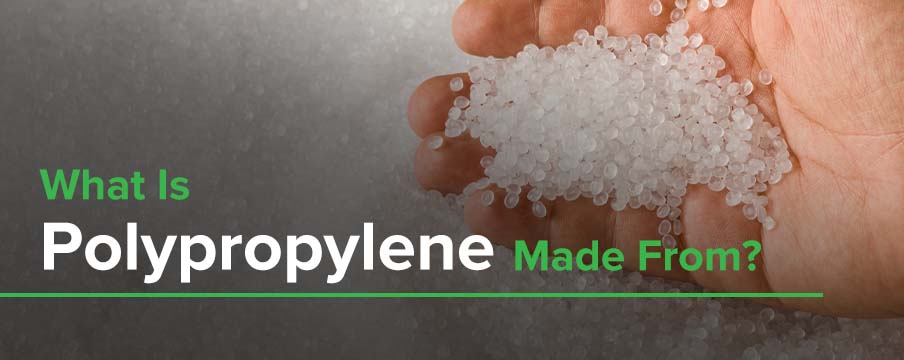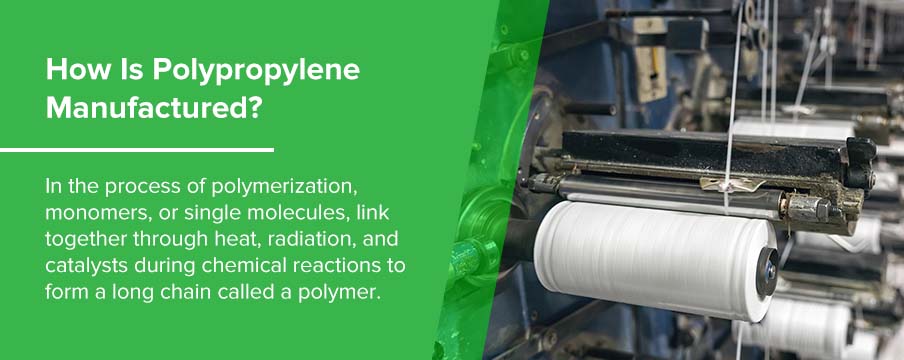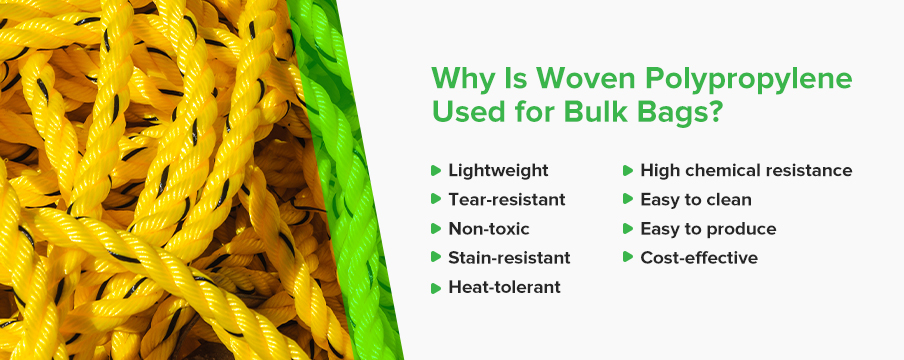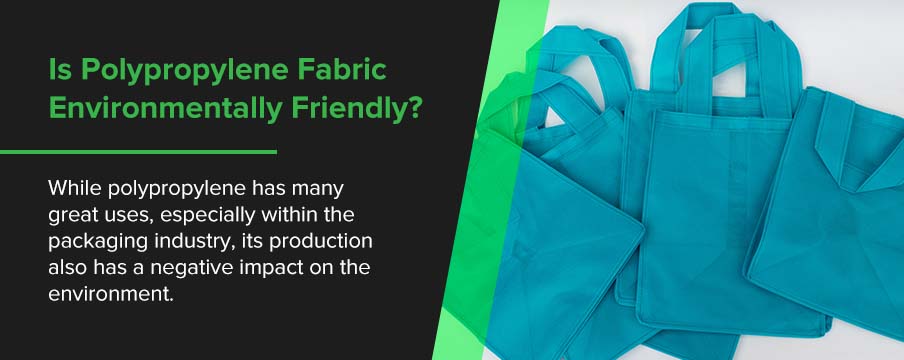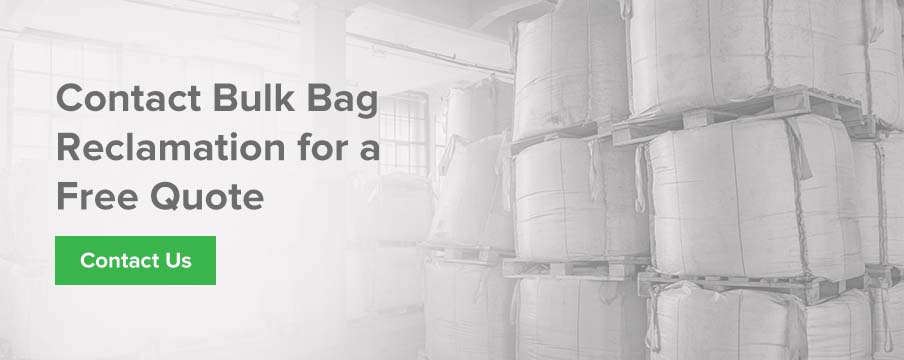What Is Polypropylene Made From?
Plastic is a common feature of our daily lives, from the packaging on the food we eat to the household items we use every day. One of the most common commercial plastics is polypropylene.
Polypropylene is a highly versatile material present in many facets of your life, from the parts on your car to the carpet underneath your feet. It’s also one of the most widely used materials in the packaging industry. Knowing about the benefits of polypropylene, as well as its environmental impacts, will help you make informed choices about your company’s bulk containers.
What Are Some Common Uses of Polypropylene?
Polypropylene is useful as both a hard plastic and a fiber, used in various items such as batteries, medical devices, car parts and furniture. One of polypropylene’s most common uses is as a fiber. Examples of polypropylene fabric include carpets, upholstery, disposable diapers and automotive interiors.
Polypropylene fibers also make up storage and transportation containers. In 2018, the packaging industry used 14.5 million tons of plastic, more than any other industry worldwide. Polypropylene’s many benefits allow for it to take a prime spot as a durable, versatile packaging material.
How Is Polypropylene Manufactured?
Polypropylene is a thermoplastic resin, a category of plastic that softens and becomes moldable under high temperatures and hardens back into a solid under low temperatures. The softening and hardening process is endlessly repeatable because of polypropylene’s rigid molecular structure, which can be melted and molded without losing integrity.
Polypropylene forms from the polymerization of propane monomers, which are chemical compounds of carbon and hydrogen. In the process of polymerization, monomers, or single molecules, link together through heat, radiation, and catalysts during chemical reactions to forma long chain called a polymer.
When polymerized, polypropylene forms one of three different chain structures — atactic, isotactic, and syndiotactic. Each chain structure has different properties. Isotactic polypropylene, for example, has the highest melting point because it has the most crystalline structure, meaning its bonds are stronger and will stay intact at high temperatures that would break the bonds in other structures.
The two main types of polypropylene are homopolymers and copolymers.
Polypropylene homopolymers exist in a semi-crystalline form, meaning they’re slightly flexible while still being stiff and strong. Their flexibility makes them ideal for packaging, textiles and electrical products.
Polypropylene copolymers are softer, giving them good impact strength and making them crack-resistant under stress. Copolymers exist in two forms. Polypropylene random copolymers are flexible and clear, so they’re best for translucent products. Polypropylene block copolymers consist of monomers that are arranged in a more regular formation, so materials made from this type are rigid and strong and often used in industrial contexts.
How Is Polypropylene Fabric Made?
Polypropylene fibers are made through a melt-spinning process. First, polypropylene is mixed with chemical additives, such as linear polystyrene, that break down its dense structure so it’s more suitable for weaving. Polypropylene and the additives combine through melt intercalation. In this process for synthesizing thermoplastics, polypropylene is heated, filler molecules are added, and everything is kneaded together until uniform.
After melt intercalation, the synthesis is dried into pellets. The pellets are then heated to very high temperatures to prepare for extrusion. During extrusion, the polypropylene pellets go through a pressurized spinning machine that spins the pellets into thin filaments.
These filaments are heated again, this time heated and drawn into uniform strands by passing through rollers that stretch and flatten them until the individual fibers straighten, and the finished product is flat strands of polypropylene. The polypropylene strands are then woven into materials used to make flexible intermediate bulk containers (FIBC bags) and other textiles.
China produces most of the world’s polypropylene, manufacturing 20.2 million tons in 2016, and much of the world’s polypropylene comes from Asia and Europe.
Why Is Woven Polypropylene Used for Bulk Bags?
Polypropylene fabric’s various material properties make it a well-suited material for the packaging industry. It’s a strong, dependable choice for bulk bag manufacturing for several reasons. Its chemical and economic benefits include:
- Lightweight: Polypropylene is one of the most lightweight commercial plastics. You can store and ship FIBC bulk bags with ease, and the weight of the bags themselves won’t contribute too much to the weight of the overall products.
- Tear-resistant: Polypropylene strands are flexible, so they can withstand heavy weights without cracking or tearing. When woven together into a bag, this material becomes even stronger, creating overlapping layers that work together to contain thousands of pounds of goods at a time.
- Non-toxic: Polypropylene’s high melting point means it won’t easily melt into food products, and it doesn’t contain many harmful chemicals such as BPA and phthalates. It’s often used in food packaging for this reason.
- Stain-resistant: Polypropylenehas no active dye sites, so it’s naturally able to resist stains and discoloration.
- Heat-tolerant: Polypropylene’s crystalline molecular structure gives it its stiffness, accounting for its relatively high melting point of 167 degrees Celsius. It requires more heat to break its strong bonds than other plastics.
- High chemical resistance: Polypropylene is resistant to chemicals commonly found in products from various industries. Polypropylene is resistant to many diluted and concentrated acids, bases and alcohols. It also resists aldehyde, esters, aliphatic hydrocarbons and ketones. Being resistant to such a wide range of materials makes it an excellent option for bulk bags across various industries.
- Easy to clean: Polypropylene has low moisture absorption, so it resists embedding stains, and most messes easily wipe off the surface. The cleanability of polypropylene is one of the factors that makes FIBC bulk bags reusable.
- Easy to produce: Polypropylene is easy to extrude because of its flexibility at high temperatures. Weaving the fibers together is a fast process that creates a durable finished product.
- Cost-effective: Polypropylene comes from petrochemicals, which are oil and natural gas. These natural resources are cheap to extract from the earth, meaning lower upfront costs.
What Are Some Uses for Polypropylene FIBC Bags?
Polypropylene is a popular choice of material for making FIBC bags. This durable woven fabric allows for efficient transportation and organized storage of countless materials, especially when applied to a variety of bag designs, including:
- Duffle top: These bags can fully open and close at the top, so they’re great for storing and transporting products you need to keep secure, such as loose gravel or grains that may spill. You can buy them with or without baffles to suit your company’s unique needs.
- Spout top: These bags feature a narrow spout at the top for efficient, less-mess filling and emptying. They’re ideal for filling with small, fine goods such as animal feed, grains or seeds.
- Open top: These bags are fully open at the top for maximum breathability, with additional ventilation strips along the sides. They’re perfect for products that need extra space or ventilation during storage or transportation, such as plants or harvested crops. The open top is also great for easy access to contents and manual filling. With no height restrictions, this style is great for moving oddly shaped objects or for overfilling with materials when necessary.
- Baffled: These bags have reinforcement panels on the sides to prevent sagging or leaning as you fill them. They keep their square shape to allow for easier transportation and stacking. The stiff sides also provide an extra level of protection for items that might need it.
Polypropylene FIBC bags have multiple uses across diverse industries. In agricultural contexts, you can use them for crop storage, transport and sales. Bulk bags are ideal containers for all three steps, saving you time and money as you organize your harvests and keep goods safe.
Baffled bags protect softer vegetables and fruits from getting bruised or squished, while open top bags help crops like grains stay ventilated and free from enclosure with unwanted moisture. Whatever products you grow and harvest, FIBC bags help you manage bulk contents such as salt, rice, flour, seed, feed, hemp and legal marijuana.
FIBC bulk bags are also durable enough for use on construction sites. The strong, flexible polypropylene fabric will ensure they’ll stay intact even as you handle heavy materials like cement, gravel, sand and dirt.
Baffled bags offer another layer of protection against breakage. These bags can haul building materials like lumber, stone, debris, asphalt and metal. They can also help you organize materials by storing them in the same bags you transport them in.
Duffel top bags ensure fine materials like sand and soil won’t spill from the bags, while open top bags allow for easy manual loading of bulky materials.
Is Polypropylene Fabric Environmentally Friendly?
While polypropylene has many great uses, especially within the packaging industry, its production also has a negative impact on the environment. Some concerns with polypropylene fabric include:
- Carbon emissions: Since plastic production depends on fossil fuels, making polypropylene contributes to climate change. When fossil fuels are burned, they emit greenhouse gases such as carbon dioxide, which trap heat inside the earth’s atmosphere. Plastic production alone could account for 15% of global carbon emissions by 2050 if the world continues to produce plastics at the rate it is now.
- Depleting fossil fuels: The continued production of polypropylene and other plastics is also unsustainable. Fossil fuels are an ever-depleting resource that won’t be around forever if industries continue to use them at the same rate they are today.
- Plastic waste: Plastic waste buildup is another environmental concern. Polypropylene isn’t biodegradable, so when it’s discarded, it sits on the ground and builds up over time. In 2018, landfills received 27 million tons of plastic, on top of what had already been accumulating there for decades.
- Chemical pollution: The chemicals involved in polypropylene production are also an issue. Polypropylene is made using additives that improve its plasticity. However, when even small amounts of these additives get released during production, they can contaminate the surrounding environment. Plastic production produces carcinogens, neurotoxins and other toxic chemicals that pollute air and water.
- Hydrocarbon contamination: Polypropylene is made by cracking natural gas molecules to get propylene, which is polymerized into polypropylene. Propylene extraction involves combusting fossil fuels, which are made from hydrocarbons. The incomplete combustion of hydrocarbons releases propylene into the environment, where it can further contaminate air and water.
While creating new plastics is toxic and unsustainable for our environment, you can take steps to make your polypropylene use more environmentally friendly.
Environmental Benefits of Buying Used Polypropylene Fabric Bags
Buying used, refurbished FIBC bulk bags is one of the best ways to limit your business’s consumption of new plastics. Using refurbished bags means you’re keeping bags that already exist out of landfills by giving them another life and reducing the need for new bags to be produced, which releases greenhouse gases.
Beyond the environmental benefits, there are many other reasons to choose refurbished bulk bags. Used bags cost less than new ones, which means you’ll save money while receiving products that are of the same high quality as new bags. Buying used bags will also help you save money on shipping and storage costs, as Bulk Bag Reclamation ships these lightweight bags to you folded and compacted so you can maximize your space.
Here at Bulk Bag Reclamation, we follow strict reconditioning measures to ensure that you only get used bags that are just as good as new ones. Our process includes:
- Ensuring each bag is only used once before we refurbish it and sell it to you.
- Ensuring each bag has only ever held dry-flow human or animal consumption products, making them completely free from toxic chemicals.
- Inspecting each bag for defects, and repairing small holes, replacing ropes and strings, and securing discharge spouts.
- Cleaning each bag following minimal residue standards.
Refurbishing bags already in existence is the best method of keeping polypropylene out of landfills and reducing our collective carbon footprint. However, sometimes bags are past the point where they can be refurbished. In this case, you can still take action to help the environment.
Polypropylene is recyclable, meaning it can be endlessly melted down and remade into other bulk bags without damaging the chemical structure that makes it so durable, flexible and lightweight. By recycling your bulk bags, you’re decreasing the need for virgin material production by reusing material already in existence. Bulk Bag Reclamation will recycle any bags that aren’t suitable for refurbishing, so you have options for giving your used bags another life.
Contact Bulk Bag Reclamation for a Free Quote
FIBC bulk bags made from polypropylene are some of the most versatile products on the market today. Polypropylene’s chemical properties allow for a woven material that’s simultaneously strong and flexible while also being resistant to heat and able to withstand the heavy lifting that often comes with agricultural and construction work. From hauling gravel to storing animal feed, an FIBC bag is ideal for every industrial need.
Reused FIBC bags are economical for you and friendly to the environment. Take advantage of the many benefits of woven polypropylene bags while creating less waste and giving existing plastic another use.
Bulk Bag Reclamation can provide you with the right bags for your business. Whether you’re looking to buy refurbished bags or sell us your old ones, we want to hear from you! Contact us today for a free quote!

